Bethany Maines's Blog, page 17
May 11, 2016
Personal Fitness
Originally published at the Stiletto Gang on 05.11.16
I’m going to let you in on a secret – writing is not for wussies. It’s for old people.
Or at least it makes you feel old. Carpal tunnel. Eye twitches and strains. Aching neck, sore back. The human body was not designed to spend hours sitting at a computer, and the hours compound into stiff muscles that have forgotten how to move. Walking into the kitchen after a prolonged bout of editing, I look like I’ve escaped from the neighborhood old-person jail… er… assisted living facility. I imagine that back when writers were churning out novels by quill and candlelight that it wasn’t any better. But at least back then we were likely to die by forty anyway and probably needed to worry more about childbirth and dental hygiene than whether or not our wrists were a tad achy.
I could trot out some line about suffering for my art, but the truth is, I do many things to combat the muscular stress of sitting and writing. First of all, I got married and had a kid. Although, maybe that wasn’t quite my intended outcome when I started down the aisle, it has to be said that nothing curtails long hours at a computer like a toddler. However, the things I intentionally do to keep myself from becoming Quasimodo include walking / jogging, stretching and keeping up on my martial arts training. And then I whine and complain until my husband gives me a neck rub. And then when all else fails I break down and pay for a massage.
Below are the most common stretches I do for my wrists. These drawings were actually produced by one of my former employers – Visual Health Information. They produce drawings for physical therapists and others to give to patients. I have found all of these to be very helpful for my extended typing lifestyle.
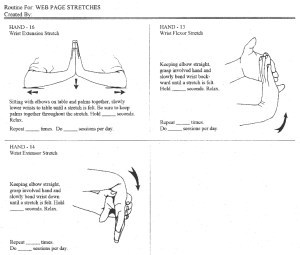
April 28, 2016
The Bag of Tricks
Originally posted at the Stiletto Gang on 4/27/16
On my last blog I discussed how I keep the fictional worlds of my books organized (answer: spreadsheets and lists!), but recently I gave a talk on writing to a local high-school and they wanted to know the more nitty-gritty details. Since they are at the start of their writer journey they have yet to discover that many of the struggles of writing are shared by all writers. What’s that? You have two great scenes, but you’re not sure how to connect them? You have half a novel written, but you don’t know who the bad guy is yet? You really need the hot guy to land in the heroine’s life, but you don’t know how he gets there? These are all questions with many possible answers, and like common core math, many possible ways of getting to the answer.
I thought Kimberly Jayne’s recent post about Mindful Daydreaming was a great way to answer many writing questions. And yesterday’s post from Sally Berneathy’s post about “pantsing” vs. plotting a novel showed how she dives and discovers her book as she goes along. I have discovered that being a plotter is usually a faster more efficient way for me to write. When I have all the answers before I start writing, I can write even when I’m not feeling very creative or if I only have five minutes. But recently, I found myself stuck on the outline. I stared. I hammered. I picked. I ignored it. Nothing happened. And at some point I decided to start writing because you know what happens when you don’t write? Nothing. So I wrote all the way to where I had outlined and I was just as stuck as I was on the outline. I was back to being a high-schooler – how do I connect those two scenes? How do I get the hero from point A to point B? Dear God, what happens nexxxxxxxt????
Which is when I decided to take my own advice. I grabbed a notebook and a pen.
Changing the medium can sometimes change my perspective. I wrote a synopsis of the story from the villain’s point of view. I wrote a synopsis from the love interests view point. I drew little diagrams about how the storylines connect. I wrote a few paragraphs about the villain’s history and motivation, really diving into what he thinks about the events of the story. It’s an old saying that each of us is the hero in our own story, and that goes for villains too (see the great post from Jennae Phillippe about A Villain’s Voice). How does a villain think that his actions are justified? As I answered that question, I discovered more and more about how my story moved forward. Which is when I put down the pen and typed up my scrawling notes.
Organizing a novel isn’t just about filing systems; it’s about herding all your characters and ideas into a coherent plot and making sure that everyone gets to the end (or the right end if they happen to be the designated dead body) in a satisfying manner. But sometimes a writer needs to reach into her bag of tricks and try more than one technique to get the job done. As I told my room full of high-schoolers, when in doubt… try, try something else.
April 20, 2016
A Mascara Massacre
When I received the usual fistful of useless bits of dead tree along with my receipt from Walgreen’s I almost chucked the entire lot in the trash, but decided to do the environmentally responsible thing and chuck them in the recycling at home. Imagine my surprise when, once home, I realized that one of the coupons actually had value to me. That never happens. It’s always twenty coupons for spam and baby food or spam baby food. I read and re-read the coupon, checked the fine print – it really was a coupon for a FREE mascara. But, but, but… I love FREE. And mascara – I love mascara! This can’t be right. I read the coupon again. Yes, it definitely said free mascara.
The next week, I trotted in, picked up my mascara, handed in my coupon and waited for the other shoe to drop. Nope, still free. I walked out with a tube of Revlon Ultimate All-in-One mascara and floating on a cloud of euphoria that can only be generated by free make-up products.
A week later that cloud had evaporated under the wilting heat of real life testing. This mascara is possibly the worst mascara I have ever used. At first glance it looks OK, the formula seems a little thick, but hardly unsual. But two hours after applying I look like the member of Our Gang known as Freckles. The mascara leaves a nuclear dust cloud of black particles strewn across my face and clothes. I would have less mess on my face if I simply threw the mascara brush at myself. This more than any other product I have ever owned has caused people, including strangers, to say, “Um… you’ve got a little… something?” while tapping awkwardly at their face.
Conclusion: Yes, I got free mascara, but I got what I paid for. Definitely NOT Carrie Mae approved.
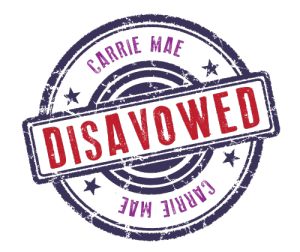
April 6, 2016
Organizing My World(s)
An author’s job is not just to tell a story, but to decide how a story should be told. Is it better in first or third person? Is it told in one long march of words or are their chapters? We have to decide genre, tone and feeling. And once those decisions have been made an author must create and track the main plot of the story – the one that we struggle to capture in the blurb text on the back cover – as well as the sub-plots, underlying themes, and finally, the characters themselves. All of those pieces require not just the ability to write, but also the ability to track information. Because, as any serious reader will tell you (sometimes at great length), consistency and details matter greatly to a well written book, and while we can rely on an editor for some items, they are only human and can only catch so much. It is in an author’s best interest to provide the cleanest manuscript possible.
I’m currently working on two vastly different stories: the fourth Carrie Mae Mystery Glossed Cause and a Romance Horror novella Wild Waters. Each story comes with an array of characters, research and plot twists that to be perfectly honest I can’t hold in my brain. Possibly pre-production of a toddler I could have kept hold of all the details, but no longer. Now, to keep all my worlds organized, I must rely on a system of notes, plot outlines and spreadsheets.
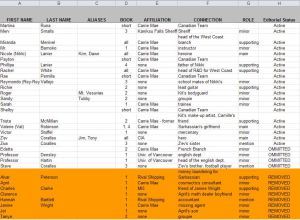 For the Carrie Mae books I track characters with a spread sheet that notes who they are (name, basic role, job or company) and also what book they have appeared in or if they have been deleted or omitted from a book. I also have a rather extensive style sheet that helps me keep track of how certain things, such as chapter headings are formatted and whether or not I’m consistently formatting things like “AK-47” and “INTERPOL” the same way over multiple books.
For the Carrie Mae books I track characters with a spread sheet that notes who they are (name, basic role, job or company) and also what book they have appeared in or if they have been deleted or omitted from a book. I also have a rather extensive style sheet that helps me keep track of how certain things, such as chapter headings are formatted and whether or not I’m consistently formatting things like “AK-47” and “INTERPOL” the same way over multiple books.
 For Wild Waters I’m writing in two different time periods – WWII and Vietnam – and they each use distinctive slang that I organize in a couple of basic lists. There are also multiple character points of view and it is important to keep track of what characters know and when they know it, so that each plot point is revealed at the correct time. Tracking character arcs are more difficult and sometimes require multiple ways of visualizing. I will frequently write out the plot from each characters point of view or I will graph it out on a virtual whiteboard, utilizing the main plot points.
For Wild Waters I’m writing in two different time periods – WWII and Vietnam – and they each use distinctive slang that I organize in a couple of basic lists. There are also multiple character points of view and it is important to keep track of what characters know and when they know it, so that each plot point is revealed at the correct time. Tracking character arcs are more difficult and sometimes require multiple ways of visualizing. I will frequently write out the plot from each characters point of view or I will graph it out on a virtual whiteboard, utilizing the main plot points.
There is no perfect system of course, and each author must work the way that works for them. But when examining a well-written book, I am frequently in awe, not just of the beautifully constructed words or strong turn of phrase, but the underlying construction of a book. Sometimes, I find it amazing that any books get written at all.
March 23, 2016
Digital Publishing
By Bethany Maines
Recently, I’ve been learning about the nitty gritty “how-to” of e-publishing. While there are many how-to’s on how to put your story up for sale in the virtual marketplace, learning how to make an epub file is a lot more difficult and confusing.
As someone trained in how to make print books, this status is infuriating to me. I can make words magically appear on paper – why is the screen any more difficult? But as it turns out epub formatting is more akin to website programming than to traditional book design. Both epub and websites must account for the fact that the designer can never be certain what or how the end user will view their product. Will it be on a phone, a tablet, or a desktop screen? Will it be a horizontal or vertical? Which operating system will be accessing the file? All of these factors play into how an e-book is seen and creating a file that can be used in ANY format means that many of the traditional design elements beloved by graphic designers, such as color, size, and forced white space, must be set aside. Learning to create an epub is a bit like feeding content into a slot in the wall, letting the machine in the next room whir away, and then trying to guess how the machine works by looking at the book it produces
In the last few years website programming has experienced a burst of development that can make creating a website an almost drag and drop, WYSISWYG experience. Meanwhile, digital publishing lags behind, still in it’s infancy.
Take a look at these images of the first page of my third Carrie Mae Mystery novel, High-Caliber Concealer. One is a screen cap from a mobile phone kindle app and the other is a photo of the printed book.
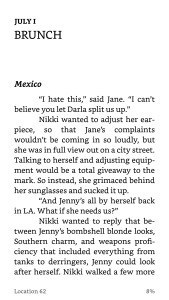
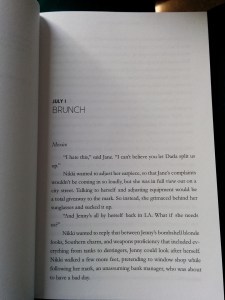
You’ll notice several differences – the large area of white space before the chapter title is gone and the fonts are not the same. Fonts in epub’s must utilize a websafe font or embed the font within the file. But, not all devices recognize embedded fonts, and they make a file larger and some platforms take a percentage out of an author’s royalty based on download size (you’re hogging space on their server).
However, there are some similarities that the programmer managed to achieve. Notice how the gap between “Brunch” and “Mexico” mimics the print version? And you’ll see that while the font isn’t the same, the font hierarchy and general sizing of the chapter information is the same as the print version.
And beyond the appearance of words on a screen there is the tricky business of making all the chapters appear in the right order and having a hyper-linked (click and go) table of contents that allow readers to navigate easily through the book.
No digital book is as simple as a word doc you type at home. So if you see a well-crafted book on your e-reading device, take a moment to appreciate the book programmer!
March 9, 2016
Bethany’s Rules for Marketing
In my quest for world book domination I frequently peruse tips on how to better market myself/books. Some come up with some interesting strategies that are worth pursuing and then there’s this list…
 I won’t mention the name of the blog I found it on because I don’t believe in public shaming. But let’s just assess a few of the items on this list shall we?
I won’t mention the name of the blog I found it on because I don’t believe in public shaming. But let’s just assess a few of the items on this list shall we?
Comment on Blogs – The theory is that you will become recognized and friends with other blog commenters as well as those running the blog and then you will RISE TO FAME! Or… not. Of course, having additional friends will help you expand your fan base. But pursuing that strategy for the sake of selling books is so lacking in any genuine feeling that it will actually turn people against you.
Bethany Rule #1 – always be your best self online. Only comment on a blog if you have something interesting and positive to add to the conversation. Trolls don’t sell books.
Create a Viral Video – Let’s just hop right on that shall we? We’ll get out or cell phones and film our cats and then, bam, done! As this article on Slate indicates, only 10% of YouTube videos get more than 1000 views. Videos these days are higher in quality and there a simply MORE of them out there than in the beginning days of social media. Here’s my attempt at a viral video – it’s awesome, you should watch it. But I only paid for food for the crew and a make-up artist to make the video happen, everything else was done in trade. I felt comfortable with my investment and I view the video as a great sales tool to introduce people to my book series, but I never counted on it going viral.
Bethany Rule #2 – if you have to pay a lot of money for a product that you’re going to giveaway for free, it’s probably not worth it.
Go on National TV – Yup, I’m just going to dial up Oprah right now, promise her some bread, and book myself on National TV. Getting air time, particularly on a National level, is one of the things that happens when you’re ALREADY famous. There’s a reason Donald Trump has ceased to advertise. He’s getting 15% of the national news time (according to a recent news piece I saw on my local news) and 50% of the election coverage. He doesn’t NEED to advertise. I’m not recommending that you be Donald Trump – one is more than enough – but being getting air time is something that you either pay for, or you get because your famous for something already.
Bethany Rule #3 – work to be locally famous. Join groups. Send press releases. Volunteer to judge writing contests. Talk to people. Network and connect – people sell books.
The internet is full of many tips, some are more helpful than others. I just hope that you find mine a little more helpful than the one from the blog that shall remain nameless.
February 29, 2016
Suprise! It’s a Book!
The most surprising thing for me about being published was how much fun it sucked out of writing. I don’t suppose an agent, editor, or marketing person ever intends to suck the joy out of someone else’s life, but my experience with the publishing industry has been that mostly it’s a joy suck. I went from writing with a gleeful eagerness to staring at the computer screen in annoyance and spending far more time on marketing than I ever predicted.
 I suppose I shouldn’t have been surprised by it. As a graphic designer by trade, I have a keen understanding of the collaborative nature of creating art that meets the needs of multiple user groups. If you don’t know what that means, then may God bless you and keep you in that state. Graphic Design (in my case specializing in print and signage) is an artistic endeavor designed to inform a consumer about a particular item, message, or company. I could spend a books worth on the craft of graphic design, but basically it is a balancing act between my vision as an artist and the vision of a client. In an ideal situation, both visions mesh to create art. In the worst case scenario, someone who thinks they could do your job if only they knew more about “the Photoshop” stands behind you and tells you what to do.
I suppose I shouldn’t have been surprised by it. As a graphic designer by trade, I have a keen understanding of the collaborative nature of creating art that meets the needs of multiple user groups. If you don’t know what that means, then may God bless you and keep you in that state. Graphic Design (in my case specializing in print and signage) is an artistic endeavor designed to inform a consumer about a particular item, message, or company. I could spend a books worth on the craft of graphic design, but basically it is a balancing act between my vision as an artist and the vision of a client. In an ideal situation, both visions mesh to create art. In the worst case scenario, someone who thinks they could do your job if only they knew more about “the Photoshop” stands behind you and tells you what to do.
But writing was something that was mine – completely, gloriously – mine. I wrote my first published novel Bulletproof Mascara to please myself. Every day of writing was like falling down the rabbit hole and discovering what came next. Some days were harder than others, but each day I spent with my imaginary friends was fun. When the manuscript was complete, I made the edits suggested by beta readers because I agreed with them. Everything I did for that first book was because I liked it that way.
Then came New York. There were changes (more changes), changing editors, (changing economy) and suggestions that I “work on plotting,” work on this… work on that… Basically, stop pantsing it. Stop dropping down the rabbit hole. Stop having fun. Sit up straight. Brush your teeth. Cut your hair. Get a real job.
OK, maybe no one ever actually said those last few. But it felt like that.
So why stick with it?
Oh, sigh. That’s the worst part. Because it made me a better writer. My plotting did need work. My “perfect” text can always stand to be pared back, because damn, but I do get verbose on occasion. And let’s face it, the things I don’t know about grammar will continue to infuriate copyeditors for years to come even as I slowly improve. Then, it turns out, that marketing (AKA talking to readers) is actually enjoyable. Who knew?
It took me awhile to reclaim the joy in writing, but self-publishing a few short stories and the kind comments of readers helped. I now look forward to my next adventures in writing and hope that you will too.
February 24, 2016
Writing for Real(ism)
My brother and his wife recently sent out some new baby pictures and an update on how they’re doing. With the baby at 10 weeks old they are getting approximately 5-7 hours of sleep and they declared it “luxurious”. Oh, I remember those days! If you read my post on Mom’s vs. Navy Seals “Hell What Now?” you know that I’m sympathetic to the trials of sleep deprivation. But now that I’m a bit more on the other side (next stop – terrible two’s!), I’m intrigued by the idea of how I can apply this knowledge to my characters.
Writers are told to add physical characteristics to their characters and bring realism to the fictional world. And I think all writers enjoy building a character dossier – eyes, hair, height, tattoos. But I think until I had my child it didn’t occur to me to build in the psychological effects of physical changes and stresses. When one gains weight, there are changes such as bumping into things you didn’t used to (I swear I didn’t whack my baby belly with the car door more than 8 or 12 times). With weight loss people can find themselves turning sideways to go through doorways that fit them just fine. And what about memory and focus problems that come with hormonal changes, sleep deprivation, or trauma? And as if these very physical realities weren’t enough, I think I should be asking not only “How does my character deal with this physical limitation or stress?” But also “What does my character feel about their reaction?”
Now I just have to figure out how to write all that around a dead body, 3 – 10 suspects, and a three act structure and I’m sure I’ll have a best seller on my hands.
February 19, 2016
State of Emergency
This Carrie Mae ultra-short story takes place before the events of High-Caliber Concealer. Read High-Caliber Concealer to find out what happens next!
“Thanks for giving me a ride, guys,” said Jenny, jumping into the back of my convertible blue ’67 Impala. Jenny works with me at Carrie Mae.
“No prob,” I said, checking traffic and pulling away from the curb.
“Did they tell you what was wrong with your car?” asked Z’ev, turning to look at Jenny. Z’ev is my boyfriend. He works for the CIA. He’s dreamy. Yeah, I said dreamy – deal with it.
“Alternator or something. I think I stopped listening after I heard how much it was going to cost me.”
The wind whipped her long blonde hair around her face in a way that made her look like a Ralph Lauren ad and I sighed enviously. My red curls were always in a giant rats’ nest by the time I got out of the convertible. “I’m serious! I really think…” Jenny’s thought was cut off when both our phones rang at the same time. I made eye contact with Jenny in the rear view mirror. I know about Z’ev’s job, but Z’ev doesn’t exactly know about mine. The last thing I needed was a work call to interrupt one of our rare weeks together at home in LA.
There are several problems with working for Carrie Mae. First, everyone assumes that I sell make-up. I understand. Carrie Mae is most well known for their millions of independent beauty consultants. The Carrie Mae Foundation, the non-profit charity branch and my employer, isn’t as well known and has the extremely simple goal of “helping women everywhere.” The Carrie Mae founders realized early on that helping women sometimes requires a silk glove of diplomacy and sometimes an iron fist of enforcement. Basically, the Carrie Mae Foundation is part non-profit, part black ops force. My second problem with working for Carrie Mae is that I can’t tell my family, or my boyfriend, that I’m part of the iron fist.
“It’s Ellen,” said Jenny, flipping open her phone. “911 to her place right now!”
I nodded and pushed my foot into the gas pedal.
Ten minutes later, I had barely parked before Jenny was out of the car and running up the front walk of Ellen’s townhouse. I followed slightly more cautiously, taking in the scene, looking for bad guys, wishing I was carrying. The door burst open and Ellen stepped out dressed in a slip, her short silver hair in curlers. Ellen, our team’s sniper, was usually the calm to our storm. Periodically, she’s been known to lose her cool. With Ellen if you behave like a misogynistic, racist jackhat, don’t be surprised if you suddenly end up with a bullet in your butt. Anyway, she didn’t appear to be raging, she appeared to be having a panic attack.
“You have to help me. This is… I can’t do this.” She flapped her hands, breathing heavily. “I have nothing to wear.”
Z’ev was half way out of the car, but froze in place at Ellen’s announcement.
“I’ll just wait in the car,” he said. I gave him a thumbs up and went in. I came out a few minutes later.
Z’ev had turned off the motor and was watching clouds maneuver across the sky like wide-bellied sailing ships.
“What’s up?” he asked, leaning back to look up at me.
“Ellen has a date,” I said. Z’ev made ‘so what’ sort of gesture. “It’s her first date since her husband died. And she doesn’t know what to wear.” Z’ev’s faced sucked in like he’d chomped down on a lemon.
“Ah. It’s one of those issues.”
“Jenny is in there now on tissue and dress patrol. I’m going to go in on make-up. We’ll double team on hair and shoes and be out in no more than 24 minutes.”
“Why 24 minutes?” asked Z’ev, automatically synchronizing his watch.
“Because he arrives in,” I flipped over my wrist and checked the time on my watch, “25:20.”
“I’m going to turn the car around. I’ll be parked in front, motor running,” he said.
“Good man,” I said, nodding approvingly. I looked with dread at the house – some missions were tougher than others. “All right, I’m going back in.” I marched toward the door.
“Duck and cover, baby. Duck and cover,” Z’ev called after me.
Twenty-four minutes and forty-two seconds later Jenny and I sprinted out of the house and leapt into the back seat. Z’ev threw the car into gear and launched us down the block, just as a black sedan turned the corner.
“Z’ev, slow down, we want to see what he looks like!” said Jenny. I leaned over the passenger seat to pull a set of binoculars out the glove compartment. Z’ev slowed down and we crouched in the back peering over the trunk.
“Not bad,” I said, handing over the binoculars to Jenny.
“Car’s a Lexus, but four door. Says stable, with good taste. Khakis and button up,” said Jenny, adding her assessment.
“Fashionable without being trendy,” I agreed. “Looks fairly fit.”
“Full head of hair,” commented Jenny.
Ellen opened the door and the man went inside.
“We’re not going to follow them on their date, are we?” asked Z’ev adjusting the rear view mirror so that he could watch the action.
“Don’t be ridiculous!” said Jenny.
“We would never spy on our friend,” I added.
“Uh-huh. Do you want me to put the binoculars back?”
Jenny and I dissolved into giggles, which only caused Z’ev to roll his eyes. I continued to laugh, but inside I was worried. Sometime soon, Z’ev and I were going to have to talk. How much longer was he going to believe I was a project manager for a regular non-profit? Who always keeps binoculars in her glove box?
February 10, 2016
Equal Rights for Positives
A funny thing happens when you read your own reviews – you start thinking about them.
I’m about a month away from completing the manuscript for Glossed Cause, the fourth book in the Carrie Mae Mystery Series, and I made the mistake of checking out a few of the reviews on High-Caliber Concealer (CM #3). I knew it was a bad idea. It’s always a bad idea. What happens when I get to a bad one, hmmm? It’s not like I can look the reviewer up, knock on their door and explain how monumentally wrong they are. But you think, “I’ll just look at the good ones. Just one. I can stop there.”
You know this a total lie, right? Reviews are like Pringles for the eyes. Like I can stop with just one. I open up Amazon, I’m looking and… then I read this: “If you enjoy reading about Stephanie Plum, you’ll love Nicki! Maines is getting better with each book.”
And I thought, “Hell, yeah!”
Just one? But I have popped – I cannot stop. I should read more!
Eventually, of course, I got to one with a complaint. I’d spent too much time on Nikki’s personal life. Gah! But, but, but… Glossed Cause is about her FATHER (among other things). What do I dooooooo????
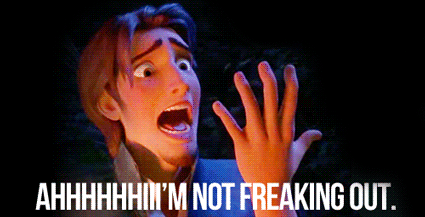
Now I’m stuck staring at the screen, half way through the book, trying to figure out if I should turn the ship or stay the course. “Stay the course!” my internal editor yells. But it’s hard to hear over the crashing waves of doubt.
I was complaining a negative comment on another project to my husband he said, “Well, I think it was awesome and my vote counts more.”
Why do the negatives get more votes? Shouldn’t the positives get equal rights? Here’s what I and anyone else who is stuck in this trap are going to do: We’re going to go back, we’re going to read the first positive review, and we’re going to believe that one. Because Maines really is getting better with every book.



